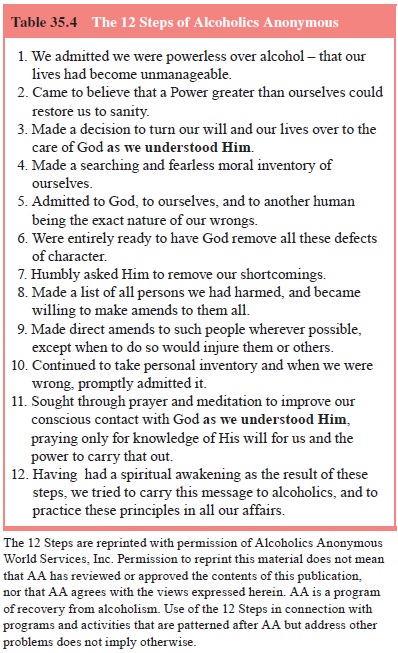Chapter: Essentials of Psychiatry: Substance Abuse: Alcohol Use Disorders
Alcoholics Anonymous (AA) and Mutual Help Organizations
Alcoholics Anonymous (AA) and
Mutual Help Organizations
Although mutual help societies composed of
recovering alcohol-ics are not considered a formal treatment, they are often
used as a substitute, an alternative and an adjunct to able value in some individuals.
Further research is required with naltrexone to determine the optimal dosage,
duration of treatment and psychosocial treatment strategies with which to use
the medi-cation. The question of whether the medication is most efficacious for
alcoholics with high levels of craving for alcohol remains an important one.
The SSRIs fluoxetine, citalopram and sertraline may be of value in subgroups of
heavy drinkers, particularly those with a later onset of problem drinking. In
contrast, ondansetron may be useful in alcoholics with an early onset of
problem drink-ing.
With an estimated 87 000 groups in 150 countries,
AA is by far the most widely utilized source of help for drinking prob-lems in
the USA and throughout the world. In addition, a number of self-help
organizations have modeled themselves after AA, basing recovery from drug
abuse, overeating, and other behav-ioral disorders on the 12 Steps of AA (see
Table 35.4). Unfor-tunately, clinicians often refer patients to self-help
groups such as AA without consideration of the patient’s needs and without
adequate monitoring of the patient’s response. Not all people are willing to
endorse the AA emphasis on spirituality and its dis-ease concept of alcoholism,
which requires lifelong abstinence as the only means to recovery. Greater
familiarity with AA may help clinicians to identify those patients who might
benefit from this approach.
Although it is regarded as one of the most useful
resources for recovering alcoholics, the research literature supporting the
efficacy of AA is limited. Attendance at AA tends to be corre-lated with
long-term abstinence, but this may reflect motivation for recovery. The type of
motivated alcoholic that persists with AA might do just as well with other
forms of supportive therapy. In fact, the few random assignment studies that
have been con-ducted (Walsh et al.,
1991) do not indicate that AA (or similar programs) is more effective than
other types of treatment.
Infrequent attempts have been made to assess the
efficacy of AA using controlled research designs because of methodologi-cal
challenges, such as self-selection and ethical concerns about random assignment
to treatment conditions. Nevertheless, sev-eral large-scale, well designed
studies (Project MATCH Research Group, 1997, 1998) suggest that AA can have an
incremental ef-fect when combined with formal treatment, and AA attendance
alone may be better than no intervention.
A study of long-term outcomes of treated and
untreated alcoholics (Timko et al.,
2000) indicates that individuals who ob-tain help for a drinking problem,
especially in a timely manner, have better outcomes over 8 years than those who
do not receive help, but the type of help they receive (e.g., self-help or
formal treatment) makes little difference in long-term outcomes.

Related Topics